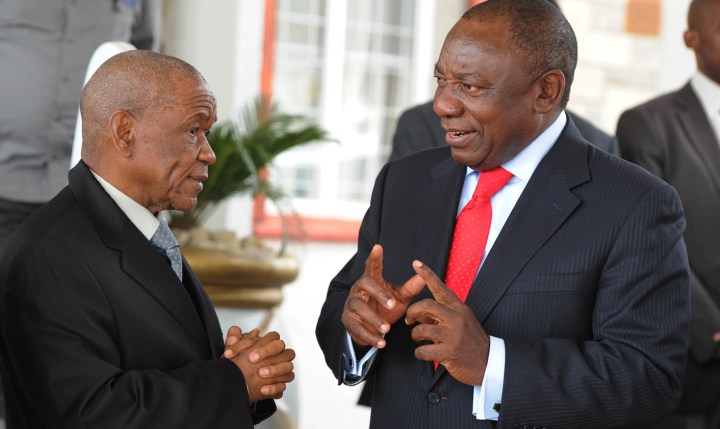Africa
Limbo in Lesotho: The limits of South Africa’s soft power

It’s been several weeks since the coup that wasn’t in Lesotho, yet there’s been little progress in unravelling the tense political stand-off there. This comes despite the best efforts of President Zuma and his deputy, Cyril Ramaphosa, who have both invested plenty of time and diplomatic capital in efforts to find a solution. SA’s influence only stretches so far, apparently. By SIMON ALLISON.
Given the frequency with which South Africa’s president and deputy president have been spotted in Lesotho over the past couple of weeks, South Africans could be forgiven for wandering exactly which country their leaders are currently governing.
Ever since the bizarre was-it-a-coup-wasn’t-it-a-coup late last month, South Africa has brought the full weight of its influence to bear on its tiny neighbour, dispatching its very biggest diplomatic guns to Maseru, the picturesque mountain capital.
In the first couple of weeks of September, President Jacob Zuma met with Lesotho’s squabbling politicians twice in Pretoria and twice in Maseru. Subsequently, Deputy President Cyril Ramaphosa took over his role as mediator. Ramaphosa is currently on his second visit to Maseru, where he is once again trying to persuade the main players in the current impasse to put their country’s interests ahead of their own.
That Lesotho should attract so much high-level attention from South Africa is no surprise. Not only has South Africa been mandated by SADC to resolve the Lesotho crisis, but Gauteng is depending on Lesotho for the bulk of its future water supply.
A resolution should be an eminently achievable assignment for a country that fancies itself as an African superpower. After all, poor Lesotho is completely enveloped by South Africa, meaning it relies on South Africa for pretty much everything, from jobs to investment to access to the outside world. Surely, this is one crisis in which South Africa holds all the cards, and it is one that it should have no trouble putting to bed.
Alas, it’s not quite as simple as that. “It’s a strange dynamic,” observed John Aerni-Flessner, an assistant professor of African History at Michigan State University, and a specialist on Lesotho. “South Africa holds the ultimate reins, which is why we saw so much restraint [from Lesotho’s key players] following the gunplay at various times. Everyone realises that if they cross the line on violence it will bring a heavy-handed SADC response led by South Africa, because of water and vested interested and South Africa’s need to be a regional policeman. But in terms of sorting out the underlying political issues in Lesotho, South Africa doesn’t have as much sway as it would like to have.”
South Africa, in other words, is plenty powerful enough to prevent Lesotho from spiraling out of control. However, perhaps thanks to Lesotho’s long history of aggressive independence from South Africa, it doesn’t necessarily have the clout to force Lesotho’s leaders to make concessions, or even to get them to enforce the concessions already made. Moreover, Lesotho’s leaders know that South Africa is still haunted by the scars of that ill-fated 1998 invasion, when at least 113 people died – including dozens of South African soldiers – in a misguided effort to prevent a coup.
The latest broken promise came on Friday, when parliament was supposed to return from its current suspension (according to the Windhoek Declaration, negotiated in July, again under South African auspices). It didn’t, and there’s no sign that the legislature’s doors will open any time soon.
Here’s the sticking point on that particular issue: Prime Minister Thomas Thabane, who kicked off the current crisis when he suspended parliament and sacked the army chief, knows that he will face a vote of no confidence the moment that parliament re-opens. He is almost certain to lose that vote. Thabane argues that the security situation is still too unstable to resume normal government business, and it’s easy to see where he’s coming from – both him and his newly-appointed army chief currently rely on South African troops for their personal protection. However, talk of instability and conflict in Lesotho has been exaggerated. Truth is, an overwhelming majority of citizens have been unaffected by the political crisis. The banks are open, the schools are open, the clinics are open, and everyone goes to work as normal (parliamentarians excepted, of course).
To circumvent the parliamentary roadblock, SADC is advocating for early elections – and indeed, this is one of the concessions that President Zuma managed to wring out of the fragmented ruling coalition. But how early is early? No date has been set, and all three parties in the ruling coalition will be wary of new polls, knowing that the biggest potential beneficiary is former Prime Minister Pakalitha Mosisili. He is the official opposition leader, and controls by far the largest block in parliament; should the coalition collapse, as it inevitably will, he is in an exceptional position to mount an unlikely political comeback.
Nonetheless, as it stands, the best that Zuma, Ramaphosa and SADC can hope for – indeed, the best that Lesotho can hope for – is to set a date for new elections. The longer the government remains at odds with each other, locked in political stalemate, the less actual governance goes on. Lesotho, meanwhile, is stagnating and needs a blank slate.
This, then, is the real test of South Africa’s influence in the Mountain Kingdom: can South Africa wrestle a firm commitment to a specific election date out of Lesotho’s intransigent politicans? And can it make sure that a vote actually happens then? DM
Read more:
- Limbo in Lesotho: Actually, it’s personal on Daily Maverick
Photo: Deputy President Cyril Ramaphosa is seen with Lesotho Prime Minister Thomas Thabane (L) in Lesotho on Thursday, 18 September 2014 to address the political impasse in the country. Ramaphosa was chosen as the Southern African Development Community’s facilitator in Lesotho. Picture: GCIS/SAPA


















 Become an Insider
Become an Insider